|
|
|
Sort Order |
|
|
|
Items / Page
|
|
|
|
|
|
|
| Srl | Item |
| 1 |
ID:
154681
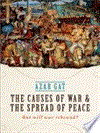

|
|
|
|
|
| Publication |
Oxford, Oxford University Press, 2017.
|
| Description |
xiv, 303p.: ill., diagrams, maps, tableshbk
|
| Standard Number |
9780198795025
|
|
|
|
|
|
|
|
|
|
|
|
Copies: C:1/I:0,R:0,Q:0
Circulation
| Accession# | Call# | Current Location | Status | Policy | Location |
| 059150 | 355.027/GAT 059150 | Main | On Shelf | General | |
|
|
|
|
| 2 |
ID:
141212
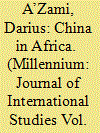

|
|
|
|
|
| Summary/Abstract |
The literature on China–Africa relations is a rapidly developing field. However, whilst it is a much richer body of work now than it was a few years ago, it has been somewhat resistant to compelling theorisation. This claim is demonstrated via discussion of three recent contributions to this literature. The discussion develops a claim that a helpful problématique might be found by framing China–Africa relations as relations between ‘unequal equals’, a particular benefit of which is that it emphasises that China–Africa relations are, inter alia specifically international relations. Whilst rigorous theoretical work has already been done, the emphasis has been societal. In this sense, the unequal equals formulation amounts to a call for greater dialogue between social and internationally oriented disciplines to resolve the under-theorisation that afflicts the study of China–Africa relations.
|
|
|
|
|
|
|
|
|
|
|
|
|
|
|
|
| 3 |
ID:
105924
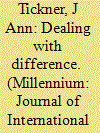

|
|
|
|
|
| Publication |
2011.
|
| Summary/Abstract |
This address suggests some avenues through which IR scholars from a variety of methodological approaches and different geographical locations might better dialogue with each other in mutually respectful ways. It begins by briefly revisiting IR's great debates since they represent the way the discipline has traditionally defined itself. It claims that these debates have centred on challenging the predominance of a US-centred discipline and its commitment to neo-positivist methodologies. Drawing on postcolonial and feminist literatures, it then offers some suggestions as to how might envisage an IR that is built on more global foundations and on a more pluralist understanding of what we define as scientific knowledge. It concludes with some thoughts on possible paths towards placing different scientific traditions on a more equal and mutually respectful footing.
|
|
|
|
|
|
|
|
|
|
|
|
|
|
|
|
| 4 |
ID:
184131
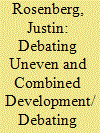

|
|
|
|
|
| Summary/Abstract |
This forum arises from an online event on the theory of uneven and combined development (UCD). Following an introduction which proposes a ‘special affinity’ between UCD and International Relations (IR), four presenters at that event discuss their ‘view from outside’ UCD, including perspectives from Global Historical Sociology, Realism, Decolonial theory and Gramscian Marxism. Meanwhile four members of the audience add their views on UCD and disciplinarity, the need for pluralism in UCD methodology, UCD and ‘whiteness’, and its potential contribution to ecological theory and practice.
|
|
|
|
|
|
|
|
|
|
|
|
|
|
|
|
| 5 |
ID:
151172
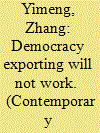

|
|
|
| 6 |
ID:
057760
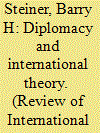

|
|
|
| 7 |
ID:
139066
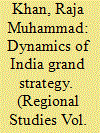

|
|
|
| 8 |
ID:
152341
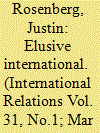

|
|
|
|
|
| Summary/Abstract |
This piece responds to the critical commentaries offered in this forum. I re-state the core aspects of the thesis and emphasize four themes related to theory in response to the critics: (1) Levels of Theory, (2) Locations of Theory, (3) Disciplines of Theory and (4) Ideologies of Theory.
|
|
|
|
|
|
|
|
|
|
|
|
|
|
|
|
| 9 |
ID:
057588
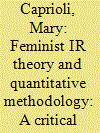

|
|
|
| 10 |
ID:
125347
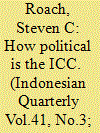

|
|
|
|
|
| Publication |
2013.
|
| Summary/Abstract |
The International Criminal Court faces many daunting political challenges in Kenya, Libya and Sudan. It has addressed these challenges and defended its impartiality in these situations by insisting that it remains an apolitical institution. This article challenges the conventional focus on the ICC`s apolitical nature by adopting an alternative approach that examines its political and pragmatic role in seeking mutual accommodation. It argues that the ICC can and should seek mutual accommodation rather than simply justice under the Rome Statute. In doing so, the article develops and applies the term diplomatic efficacy, or the political capacity of the ICC to produce acceptable solutions, by addressing the soft power dimension of such efficacy. The ICCS`s diplomatic efficacy not only reflects its special role as an independent court or agent in the interstate system, but also represents a practical and strategic to manage the political problems that its interventions and deferral to national authorities may create. The article concludes that the ICC`s political efficacy can help to resolve the incongruities between proactive complementarity and the provisions of cooperation encoded in the Rome Statute
|
|
|
|
|
|
|
|
|
|
|
|
|
|
|
|
| 11 |
ID:
152114
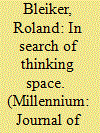

|
|
|
|
|
| Summary/Abstract |
In the 15 years since the Millennium special issue on ‘Images, Narratives and Sounds’ scholarship on aesthetic politics has proliferated.1 Countless inquiries now show how aesthetics is about far more than art: it is about rethinking the fundamental issues that drive global politics. The moment has come to reflect on the contributions of the aesthetic turn and to identify potentials and challenges ahead. I do so by stressing that the key is not agenda-setting, but to continue the search for thinking space: to explore ever new ways of writing, seeing, hearing and sensing the political. I then identify two challenges: first, to push creative work while, at the same time, increasing the ability to speak to a broad audience; and second, to avoid the hubris of overarching explanations and, instead, cultivate pluralism and self-reflexivity. The latter is important to address practices of exclusion, such as those linked to the Western legacy of aesthetic theories.
|
|
|
|
|
|
|
|
|
|
|
|
|
|
|
|
| 12 |
ID:
085440
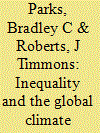

|
|
|
|
|
| Publication |
2008.
|
| Summary/Abstract |
This article explores the hypothesis that global inequality may be a central impediment to interstate cooperation on climate change policy. Conventional wisdom suggests that outcomes in international environmental politics are primarily attributable to material self-interest, bargaining power, coercion, domestic environmental values, exogenous shocks and crises, the existence of salient policy solutions, the strength of political leadership and the influence of nonstate actors. Yet none of these approaches offers a completely satisfactory explanation for the long-standing north-south divide on climate change. Drawing on social inequality literature and international relations theory, we argue that inequality dampens cooperative efforts by reinforcing 'structuralist' world-views and causal beliefs, polarizing policy preferences, promoting particularistic notions of fairness, generating divergent and unstable expectations about future behaviour, eroding conditions of mutual trust and creating incentives for zero-sum and negative-sum behaviour. In effect, inequality undermines the establishment of mutually acceptable 'rules of the game' which could mitigate these obstacles.
|
|
|
|
|
|
|
|
|
|
|
|
|
|
|
|
| 13 |
ID:
146002
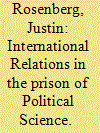

|
|
|
|
|
| Summary/Abstract |
In recent decades, the discipline of International Relations (IR) has experienced both dramatic institutional growth and unprecedented intellectual enrichment. And yet, unlike neighbouring disciplines such as Geography, Sociology, History and Comparative Literature, it has still not generated any ‘big ideas’ that have impacted across the human sciences. Why is this? And what can be done about it? This article provides an answer in three steps. First, it traces the problem to IR’s enduring definition as a subfield of Political Science. Second, it argues that IR should be re-grounded in its own disciplinary problematique: the consequences of (societal) multiplicity. And finally, it shows how this re-grounding unlocks the transdisciplinary potential of IR. Specifically, ‘uneven and combined development’ provides an example of an IR ‘big idea’ that could travel to other disciplines: for by operationalizing the consequences of multiplicity, it reveals the causal and constitutive significance of ‘the international’ for the social world as a whole.
|
|
|
|
|
|
|
|
|
|
|
|
|
|
|
|
| 14 |
ID:
100472
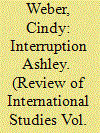

|
|
|
|
|
| Publication |
2010.
|
| Summary/Abstract |
Rather than reading the work of Richard K. Ashley as iconic - as some dead, stable image used to signify the whole of post-modern or post-structural International Relations (IR) in a single swoop - this article considers Ashley's work as an interruption to the discipline of IR (mainstream and critical). In so doing, the article suggests that what is important about Ashley's work is how it creates a thinking space where it is possible to think again about international politics, about international theory, about what Ashley's interruption itself permits and limits and about how this interruption unfolds and sometimes folds back on itself.
|
|
|
|
|
|
|
|
|
|
|
|
|
|
|
|
| 15 |
ID:
132918
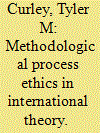

|
|
|
|
|
| Publication |
2014.
|
| Summary/Abstract |
In this review essay, I identify a commonality between Patrick Thaddeus Jackson's The Conduct of Inquiry and Daniel J. Levine's Recovering International Relations: an ethical methodological process to organize international theories in ways that promote a plurality of visions. Jackson's ideal-typification of the various methodological approaches in international relations encourages a pluralistic science. Likewise, Levine's constellation method demands a multiplicity of theoretical perspectives, in order to sustain the critical elements intrinsic to each. As I argue, this shared methodological process ethic not only advances theoretical pluralism but, in so doing, actively opens thinking space for constructing alternative political realities.
|
|
|
|
|
|
|
|
|
|
|
|
|
|
|
|
| 16 |
ID:
185865
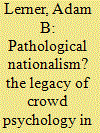

|
|
|
|
|
| Summary/Abstract |
This article investigates the intellectual history of nationalism in International Relations theory, asking how early generations of scholars understood the phenomenon and its relationship to chauvinism and violence. Despite substantial disagreements and varied intellectual influences, I argue that both interwar liberals and postwar realists shared several problematic assumptions about nationalism's pathological character that limited their imagination of its varied potential impacts. I trace these common assumptions back to the bigoted interdisciplinary field of crowd psychology, most prominently evangelized by Gustave le Bon. Le Bon's 1895 The crowd became a touchstone for subsequent generations of social and political theorists and spread ideas about nationalism that infused incipient international theory. Even as his popularity faded, his uniquely pessimistic, racist and sexist ideas about mass politics lingered in mainstream IR's narrow engagement with the phenomenon. By excavating this history, this article exposes a problematic thread that has been woven into the IR discipline, as well as a potential path to excising this bigoted thinking and nuancing discussions of the rise of nationalism in the twenty-first century.
|
|
|
|
|
|
|
|
|
|
|
|
|
|
|
|
| 17 |
ID:
185158
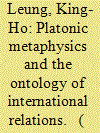

|
|
|
|
|
| Summary/Abstract |
This article offers a reading of Plato in light of the recent debates concerning the unique ‘ontology’ of International Relations (IR) as an academic discipline. In particular, this article suggests that Plato’s metaphysical account of the integral connection between human individual, the domestic state and world order can offer IR an alternative outlook to the ‘political scientific’ schema of ‘levels of analysis’. This article argues that Plato’s metaphysical conception of world order can not only provide IR theory with a way to re-imagine the relation between the human, the state and world order, but also Plato’s outlook can highlight or even call into question the post-metaphysical presuppositions of contemporary IR theory in its ‘borrowed ontology’ from modern social science, which can in turn facilitate IR’s re-interpretation of its own ‘ontology’ as well as its distinct contributions to the understanding of the various aspects of the social world and human life.
|
|
|
|
|
|
|
|
|
|
|
|
|
|
|
|
| 18 |
ID:
168881
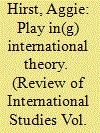

|
|
|
|
|
| Summary/Abstract |
While the study of games and gaming has increased in International Relations in recent years, a corresponding exploration of play has yet to be developed in the field. While play features in several key areas – including game theory, videogames and popular culture, and pedagogical role-plays and simulations – little work has been done to analyse its presence in, and potentials for, the discipline. The aim of this article is to introduce the study of play to IR. It does this by demonstrating that play is political, and that it is at work across the global arena. Drawing on the deconstructive tradition associated with Jacques Derrida, its core contribution is a theorisation of play. The central argument developed is that play is (auto)deconstructive. By this I mean (1) that play precipitates an unravelling of any attempt at its conceptualisation, and (2) that this illustrates the value of a deconstructive approach to international theory. This claim is substantiated through an analysis of four key binary oppositions derived from Johan Huizinga's Homo Ludens. Having shown how play powerfully deconstructs its own conceptual foundations, I argue that a playful approach offers a robust challenge to entrenched assumptions in international theory.
|
|
|
|
|
|
|
|
|
|
|
|
|
|
|
|
| 19 |
ID:
139422
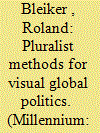

|
|
|
|
|
| Summary/Abstract |
Images play an increasingly important role in global politics but pose significant and so far largely unexplored methodological challenges. Images are different from words. They circulate in ever more complex and rapid ways. I argue that the political significance of images is best understood through an interdisciplinary framework that relies on multiple methods, even if they are at times incompatible. I defend such a pluralist approach as both controversial and essential: controversial because giving up a unitary standard of evidence violates social scientific conventions; essential because such a strategy offers the best opportunity to assess how images work across their construction, content and impact. I counter fears of relativism, arguing that the hubris of indisputable knowledge is more dangerous than a clash of different perspectives. The very combination of incompatible methods makes us constantly aware of our own contingent standpoints, thus increasing the self-reflectiveness required to understand the complexities of visual global politics.
|
|
|
|
|
|
|
|
|
|
|
|
|
|
|
|
| 20 |
ID:
170760
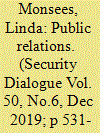

|
|
|
|
|
| Summary/Abstract |
This article contributes to the emerging literature on publics within critical security studies. Its particular focus is on contestation in the context of diffuse security technology. Contemporary security practices are characterized by diffusion and dispersion. As a result, contestation of security technology is also dispersed and diffuse and requires an account of publics that is sensitive to this aspect. The article conceptualizes ‘multiple publics’ as a mode of fundamental contestation of established political institutions. In order to do so, it discusses previous approaches to sociotechnical controversies and material participation. As a result of this discussion, it becomes apparent that we need a concept of publics that does not reduce political contestation to a pre-existing set of institutions. I develop a notion of publicness that emphasizes the way in which publics are embedded in societal struggles. This is achieved by reading John Dewey as a theorist to whom contestation is a vital part of democracy. It becomes possible to understand contestation against diffuse security practices – such as surveillance – as forms of emerging publics, even though they might not feed back into governmental decisionmaking.
|
|
|
|
|
|
|
|
|
|
|
|
|
|
|
|
|
|
|
|
|